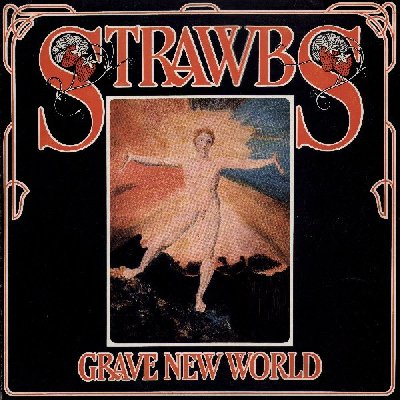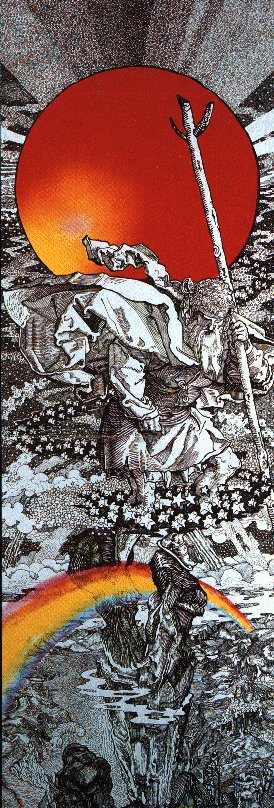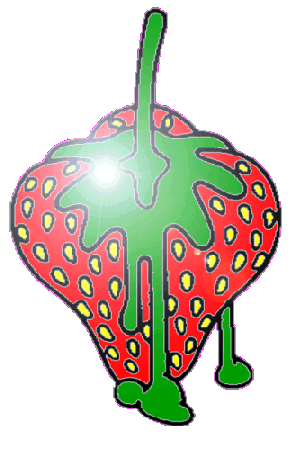
SIMPLE PERFECTION
an article by Dick Greener, celebrating the 30th anniversary of Grave New World
Back to main Grave New World page

After Rick Wakeman left the band in 1971, his replacement was Blue Weaver, who had been a member of Amen Corner during its run of chartbusting singles, and had followed Andy Fairweather-Low into his progressive band experiment Fairweather. He joined the band in October and they went straight into the studio to start work on the next album. A conscious decision was taken to start afresh with a wholly new repertoire, apart from a few of the old Strawbs classics such as "Hangman", "Jesus" and "Martin Luther King's Dream". When he joined, the Strawbs were ready to start work on the next album and Weaver was able to learn the new songs along with the other band members.
The first evidence of the new Strawbs output was the track "Benedictus", a dulcimer-based, almost hymn-like song, recorded in October 1971 and released as a single in November to whet fans appetite for the album to follow. "Let's Keep The Devil Outside" was rescued from the withdrawn "Witchwood" single and appeared as the B-side. "Benedictus" is still a very popular Strawbs number live and it has been re-recorded for the Acoustic Strawbs CD Baroque & Roll, despite, as Dave Lambert recalled when he joined the band, it being "a bastard to get to know". The track also featured backing vocals by Sandy Denny's husband Trevor Lucas and Anne Collins.
Dave Cousins' Choice Selection CD liner notes give some insight into its writing:
"Through the influence of Tony Visconti ... I was heavily into books like the Tibetan Book Of The Dead and I bought the I Ching. I said to the book, "where do we go from here now that Rick's left the band?' and threw the dice, or whatever it was, and the words to 'Benedictus' came out of the book ... 'Humble must he constant be, where the paths of wisdom lead, distant is the shadow of the setting sun' Those words were almost directly out of the I Ching, that was the answer the book gave me, but now I can't find them anywhere in it. The song was written on dulcimer - on the record, people think the melody line in the middle is played on lead guitar, but actually it's an electric dulcimer through a fuzz box. It was the first track we recorded with Blue."
Visconti wasn't able to work on the whole album, as his protege Marc Bolan's T Rex was beginning to take off, so Tom Allom was drafted in as engineer and helped the Strawbs produce the remainder of the album (bar one other track) themselves, beginning an association with Allom which was to last for 3 more years.
The opening track was the single "Benedictus", followed by one of two short solo acoustic guitar-accompanied songs by Cousins, "Hey Little Man, Thursday's Child". The companion piece ("Wednesday's Child") closed the first side. Cousins: "an older man giving advice to his young son".
"Queen Of Dreams" was written in Rimini, Italy (same trip as "Tears And Pavan") which according to Dave "has a magnificent long white beach with a pine forest framed by the mountains. In the pine forest we climbed up to the observation platforms by standing on one another's shoulders - it seemed we were floating on the top of the trees." The song introduced new sounds to the Strawbs' repertoire: after the first two verses, where the guitar chords were played in reverse order then reversed on tape, an electric dulcimer is played with a steel and put through a fuzz box and then treated via some electronic wizardry, producing the effect of a helicopter taking off over a background of various sound effects. For the third verse, back to Cousins and Hooper's acoustic guitars untreated. The track finished with an extended drum solo from Hudson, which meandered nicely between the stereo speakers (Cousins recalls that the drums were damped with wet towels, which had started drying out by the end of the song).
John Ford's "Heavy Disguise", later to become a Strawbs concert favourite as a Hudson and Ford duet, was originally intended to be titled "IRA Meeting Blues". On vinyl, Ford played and sang the song solo, with silver band backing, arranged by Robert Kirby. According to an interview with Ford in Melody Maker in April 1972, originally the track had been tried out with the whole band playing and Tony singing, but it didn't work right. The brass track was Dave Cousins' idea, resulting according to Cousins from an encounter with the Britannia Coconut Dancers of Bacup, who dance accompanied by a silver band.
The next track is probably the archetypal Strawbs track of all time, "New World" (originally entitled "Grave New World"). Opening with Cousins' thrashing 12 string, followed by crashing mellotron chords from Weaver and razor edged Cousins vocals, the track is a Strawbs classic which still features today in the full band's live sets. John Ford's percussive bass style is at its best, delivering some really vicious bass notes in the second verse. The song was, again, inspired by the troubles in Northern Ireland. Cousins recalled in the Sounds Talk In in January 1972:
"I wrote that about Ireland after watching a programme on television seeing a little kid standing on a street corner with a rifle over his shoulder and a little tin hat on his head, and all around him was the rubble of burnt out buildings and things. This sort of thing has a very profound impression on me ... these sort of songs I find I write very quickly, while other songs like "The Shepherd's Song" takes ages to write because I'm very concerned with getting the lyrics down absolutely perfectly. With these songs I'm interested in the impact at the minute, and if I took a long time writing the songs, I'd lose the aggressiveness and the emotion."

In later years, introducing the song in live sets, Cousins also recalled other images from that time, seeing children drawing in schools, and realising with horror that what they were drawing was tanks, armoured cars and wounded and dying soldiers.
Side two opened with the accapella voices of Strawbs on "The Flower And The Young Man", with Tony Hooper taking lead vocals over a keyboard-dominated backing. Cousins later explained: "When I wrote 'The Flower And The Young Man', I was writing then about a love affair that I'd had and deliberately concealing it from my family so's not to upset them." The keyboard sound on the original recording was a clavioline, an early sort of synthesiser. These days, the song has resurfaced to spectacular and powerful effect in the acoustic set of the 2001 tour and again in the Acoustic Strawbs repertoire, with Dave Lambert taking over the Hooper lead vocal part.
The second track on side two was the harsh and bitter "Tomorrow", with a writing credit to the band as a whole. On it, Cousins' vocals sound as though they have been fed through some sort of electronic shredder and the piece ends with an electric guitar-dominated instrumental which became a regular feature as an extended instrumental break in the 1972 live set. Cousins acknowledged in 1998, that the song had been written about Rick Wakeman's abrupt departure from the band, though these days Dave and Rick are best of friends again.
"On Growing Older" followed, though few may have recognised that the song was rescued from Cousins back pocket, and was at least 4 or 5 years old. A version appears on the Strawberry Sampler (1969), with only a slight change in lyric - Cousins appears to have thought "pate de fois" to be more appropriate in 1971 than "foie de gras" in the late 60s. The song is the only survivor from some early sessions for Grave New World which were discarded as things weren't working out - according to Tony Hooper, at the end of the dispiriting sessions, Cousins suggested they have a go at the song, they played it through a few times and it was in the can as quickly as that. The jangly guitar sound is Cousins' homage to the Byrds, of whom he remains a great fan.
Next, another re-emergence, this time of the actual track included in the Sampler - Tony Hooper's "Ah Me, Ah My" from the original version of Strawbs appears exactly as recorded back in 1968. Gus Dudgeon is credited with its production, the vocals are credited to the "gentlemen of the chorus" and the musicians are supposed to be "Tony Visconti's Old Tyme Dance Orchestra" - actually the Ted Heath Orchestra.
Hud's spiritual "Is It Today, Lord", which features Blue on Indian Harmonium and finishes with an extended sitar instrumental, which itself fades out into the closing track, Weaver on piano and Cousins bitter sweet vocals on "The Journey's End", a track which I think ends the album perfectly (I intend to have "Benedictus and "The Journey's End" played at my funeral - an alpha and omega of sorts).

Cousins, interviewed by Jerry Gilbert for the "Talk In" in Sounds (22 January 1971 issue), was positively relaxed about the album:
"This LP is really the best LP we've made. It was the most relaxed atmosphere in the studio we've had. Before it's been a bit tense and the last album was particularly tense where everybody was trying to make their own impression on the group. They all had something very valid that they wanted to say, but this didn't necessarily fit in with the general musical and lyrical trend ... whereas this time I think everybody's really got a hold of what the group is about."
Grave New World hit the shops on February 4, 1972, to coincide with a major UK tour, underlining the fact that the Strawbs had moved on from the clubs and college circuit to major concert hall venues. It did have extremely expensive packaging (although it was to be sold at standard price), a triple-fold sleeve, with a 12-page booklet inside, both lavishly designed by Paper Tiger. Each song had a page of its own in the booklet, with attractive woodcut-style illustrations, and the cover sported a full-frontal nude in the best possible taste - William Blake's "Glad Day" - as well as featuring for the first time the distinctive Strawbs lettering which in latter days became their more or less official logo.
The album was intended to have a loosely defined conceptual thread running through the tracks, according to Gilbert's review of the album in Sounds, "the eternal journey through life from birth to death. The songwriters place themselves in the position of the travellers, with Dave Cousins, of course, playing the leading role."
In the 1998 CD reissue sleeve notes, Cousins comments:
"Grave New World is the story of one man's life, from the cradle to the grave ... it was a major album for us, which peaked just outside the Top 10 in the UK chart. ..... I became William Blake reincarnated because of the cover picture and the lyrics. ... the album did the Strawbs an awful lot of good and was our real breakthrough album."
Reviews for the album were very positive indeed. Jerry Gilbert called it "a real work of art and a thoughtful debut by Blue Weaver". One reviewer called it maybe the "folk-rock equivalent of 'Sgt. Pepper'". It entered the charts on 26 February 1972, staying there for 12 weeks. It was also the first Strawbs album to enter the US charts. In Britain alone it sold 100,000 copies.
The album for me is the Strawbs album I'd recommend to anyone, marrying the band's folk roots with Cousins' developing rock tendencies, acoustic guitars with mellotrons, quintessentially English brass band with eastern instruments and creating a varied canvas for the insightful lyrics: it's not surprising that in the aftermath of the terrible events of 11 Sep 2001, many Strawbs fans' thoughts turned to the lyrics of "New World".
Simple perfection!



